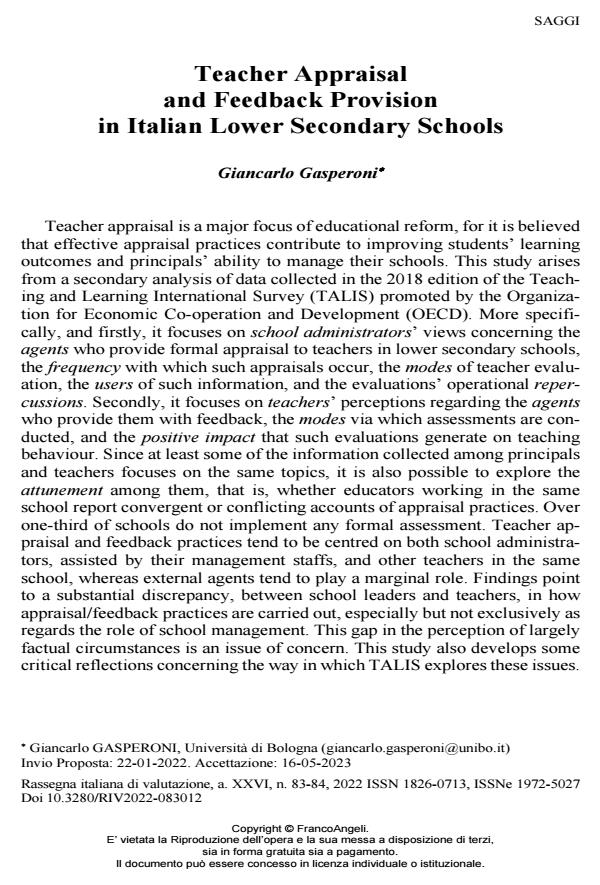Teacher Appraisal and Feedback Provision in Italian Lower Secondary Schools
Titolo Rivista RIV Rassegna Italiana di Valutazione
Autori/Curatori Giancarlo Gasperoni
Anno di pubblicazione 2023 Fascicolo 2022/83-84
Lingua Inglese Numero pagine 23 P. 224-246 Dimensione file 257 KB
DOI 10.3280/RIV2022-083012
Il DOI è il codice a barre della proprietà intellettuale: per saperne di più
clicca qui
Qui sotto puoi vedere in anteprima la prima pagina di questo articolo.
Se questo articolo ti interessa, lo puoi acquistare (e scaricare in formato pdf) seguendo le facili indicazioni per acquistare il download credit. Acquista Download Credits per scaricare questo Articolo in formato PDF

FrancoAngeli è membro della Publishers International Linking Association, Inc (PILA), associazione indipendente e non profit per facilitare (attraverso i servizi tecnologici implementati da CrossRef.org) l’accesso degli studiosi ai contenuti digitali nelle pubblicazioni professionali e scientifiche.
Teacher appraisal is a major focus of educational reform, for it is believed that effective appraisal practices contribute to improving stu-dents’ learning outcomes and principals’ ability to manage their schools. This study arises from a secondary analysis of data collected in the 2018 edition of the Teaching and Learning International Survey (TALIS) promoted by the Organization for Economic Co-operation and Development (OECD). More specifically, and firstly, it focuses on school administrators’ views concerning the agents who provide for-mal appraisal to teachers in lower secondary schools, the frequency with which such appraisals occur, the modes of teacher evaluation, the users of such information, and the evaluations’ operational repercussions. Secondly, it focuses on teachers’ perceptions regarding the agents who provide them with feedback, the modes via which assess-ments are conducted, and the positive impact that such evaluations generate on teaching behaviour. Since at least some of the information collected among principals and teachers focuses on the same topics, it is also possible to explore the attunement among them, that is, whether educators working in the same school report convergent or conflicting accounts of appraisal practices. Over one-third of schools do not im-plement any formal assessment. Teacher appraisal and feedback prac-tices tend to be centred on both school administrators, assisted by their management staffs, and other teachers in the same school, whereas ex-ternal agents tend to play a marginal role. Findings point to a substan-tial discrepancy, between school leaders and teachers, in how apprais-al/feedback practices are carried out, especially but not exclusively as regards the role of school management. This gap in the perception of largely factual circumstances is an issue of concern. This study also develops some critical reflections concerning the way in which TALIS explores these issues.
Parole chiave:teacher appraisal, teacher feedback, TALIS, principal-teacher attunement.
Giancarlo Gasperoni, Teacher Appraisal and Feedback Provision in Italian Lower Secondary Schools in "RIV Rassegna Italiana di Valutazione" 83-84/2022, pp 224-246, DOI: 10.3280/RIV2022-083012